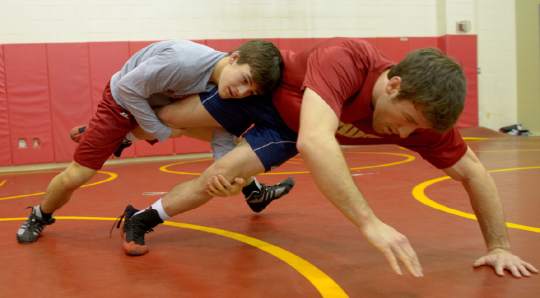2013-14
Results
and Media Coverage

In wrestling, coaching has to be hands-on
By gary estwick
Special to The Advocate
 |
|
Advocate staff photo by MATTHEW HINTON-- Brother Martin's Austin Meyers
wrestles assistant coach James Casadaban at the school Wednesday. |
|
It may be the most controversial split second of the Brother Martin
wrestling season.
On Monday, senior Austin Meyn tangled with assistant coach James
Casadaban, part of his preparation for the Louisiana High School
Athletic Association’s State Wrestling Tournament, which starts Friday
at the Ponchtrain Center. About 20 minutes into practice, Casadaban went
for a claw ride to an arm bar tilt, maneuvering his smaller opponent’s
frame like so many French fries on the cafeteria menu.
Meyn grimaced.
Casadaban eased his grip, continuing to tilt him, hoping he didn’t
injure Meyn days before his prep finale. That’s when Meyn jumped his hip
over Casadaban and wound up on top, a reversal for the ages.
“He took advantage of me,” Casadaban said later in the week, his
facial expression a mixture of disbelief and humor, even complimentary
of Meyn, whom he considers his hardest worker. “This might have been the
first points that have ever been scored on me (at practice).”
|
Meyn’s move is worth more than bragging rights in the Crusaders locker room,
far more than a fantasy matchup between teacher and pupil. For if Meyn can
withstand hip tosses and leg sweeps; half-nelsons, ankle picks and fireman’s
carries against Casadaban, a former two-time state wrestling champion at Brother
Martin and two-time NAIA All-American at Cumberland University who at any time,
outweighs him by at least 30 pounds, Meyn should experience few major challenges
this weekend.
“It’s probably the only reason I’m any good,” said Meyn, the top seed in
Division I’s 138-pound weight class
Through thousands of hours of training, cutting weight and watching film,
junior and senior prep wrestlers like Meyn become so good that their younger
teammates offer little challenge, stunting their progression. Or in the case of
guys like Holy Cross senior Michael Yeatman, the No. 3 seed at Division I 220
pounds, there isn’t always a teammate who can match his girth.
That’s where coaches change out of their dress shirts and ties in front of
the classroom. They’re often better training partners because they can wrestle
without injuring wrestlers, and can play full-time sparrer. This occurs
throughout the state.
Brusly’s Trevor Schermer (Division III, 152 pounds), who is aiming for his
fourth Division III individual state title, has spent plenty of mat hours
against coach Jimmy Bible and others. In Division II, coach Kent Masson and his
staff at Teurlings has helped heavyweight Travis Santiago prepare for the
285-pound weight class. In Baton Rouge, James Claitor (Division I, 145 pounds)
and Matt Mire (152 pounds) compete against a host of hands-on coaches at
Catholic High.
Such training blurs the line between teenagers and adults, setting wrestling
apart from its sports contemporaries. You won’t find your high school football
coach pushing a sled with his defensive linemen, or a basketball coach running
suicides with the squad, a track coach completing a full sprint workout with the
team.
Here, on wrestling mats like Brother Martin’s room, every toss and flip
challenges athletes while building bonds with coaches that last for decades.
Former U.S. Olympian Joe Corso, who mentored Brother Martin to a 2007 team
title, wrestled the school’s finest grapplers at age 56, teaching as he rolled
around the mat.
“They didn’t believe how good I was until I stepped on the mat,” said Corso,
now 62.
At Jesuit, junior Jake Eccles called head coach Spencer Harris, “a second
dad.”
“It’s almost like they’re one of your wrestling partners,” said Eccles, the
top seed at Division I 170 lbs. “Even outside of wrestling, it builds a
relationship because you and your coaches, they’re like my friends. I consider
them family.”
It starts on the mat
Coaches force wrestlers to wrestle, not manhandle opponents on the mat, which
they would often do against smaller, less-savvy teammates. Against more
experienced, bigger, stronger competition — grown men that know they tendencies
— they must be thinkers too.
Strategize.
It teaches them to react faster. To be careful about leaving openings because
a tiny mistake can force you to end a match on your back.
The challenge is to push these wrestlers, push them hard, without breaking
their confidence. For they’re much better than they appear at practice.
At Holy Cross, assistant coach T.J. Miller, a former Division III national
champion at Wartburg College, said he will shoot at senior Yeatman to see how he
reacts. If Yeatman handles it right, his sprawl keeps him on two feet, he’s
rewarded with a takedown of Miller.
Takedowns of Miller don’t come easy, mind you.
“There’s days I let him beat me up, just to build up his confidence,” Miller
said. “You can’t just beat a kid down, over and over and over. But I try my best
to stay right at or just above his (wrestling) level to kind of raise it so they
have to adjust, whether it’s speed or strength, how hard I’m going. Make the
pace faster.”
It’s not just the athletes that are subject to injury.
At John Ehret, coach Daniel LeFleur suffered two broken ribs earlier this
year during a practice session with Jack Fontenot, who at state is seeded third
at Division I 152 pounds.
When East Jefferson wrestlers ran around campus this season, up and down the
school’s football stadium steps, coach Nick Settoon was there with them,
running. When Settoon taught them a technique on the mat, he also demonstrated
it, showing its effectiveness.
The result?
“When you open your mouth to talk,” Settoon said, “they tend to listen a
little more carefully.”
Casadaban has watched Meyn improve. When he goes for shots, it’s more finesse
than brute, smooth rather than awkward as he transitions from takedown to the
top, looking for a tilt or pin. It allows him to control his matches. At Holy
Cross, Yeatman credited the sport for curbing aggression that once made him a
not-so-pleasant student. On the mat, he’s improved his defense against shots and
mentally, toughened up. He had no choice. Built out of frustration from being
dominated by Miller, Yeatman decided one day that he was going to push as hard
as it took to get to that next level.
“I’m wrestling without fear,” he said.
Improvement starts to show
Every prep wrestler has two ultimate goals: To earn a huge bear hug from
their coach to cap a state championship season. And, to return after high school
for a rematch against their former mentors, now lifelong friends and equals -
well, maybe not on the mat.
Not just yet.
“Guys come back like ‘Yeah, coach, now I gotcha,’ “ Miller said, grinning as
he set up his own punchline. “They come back and they’re immediately surprised
(when I wrestle without holding back) and come back to reality real quick.”
Well, there’s always the state championship.
Back to Top
